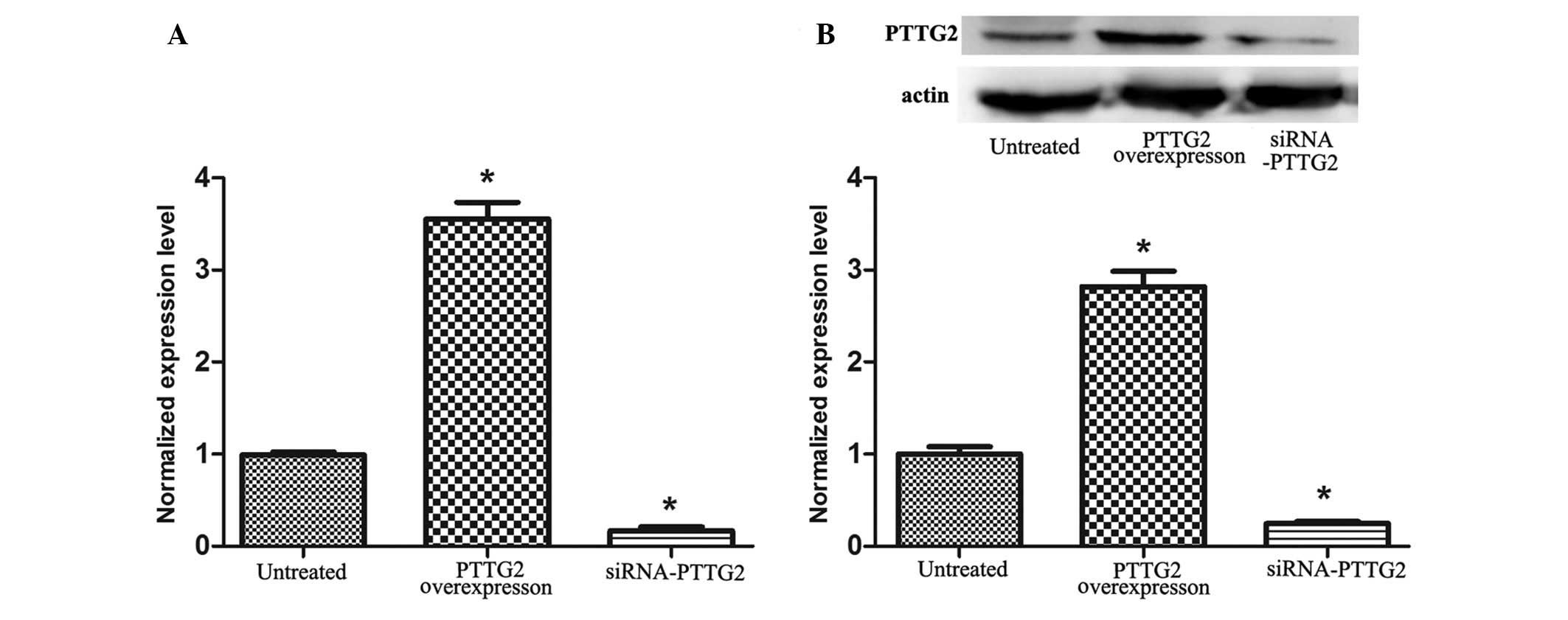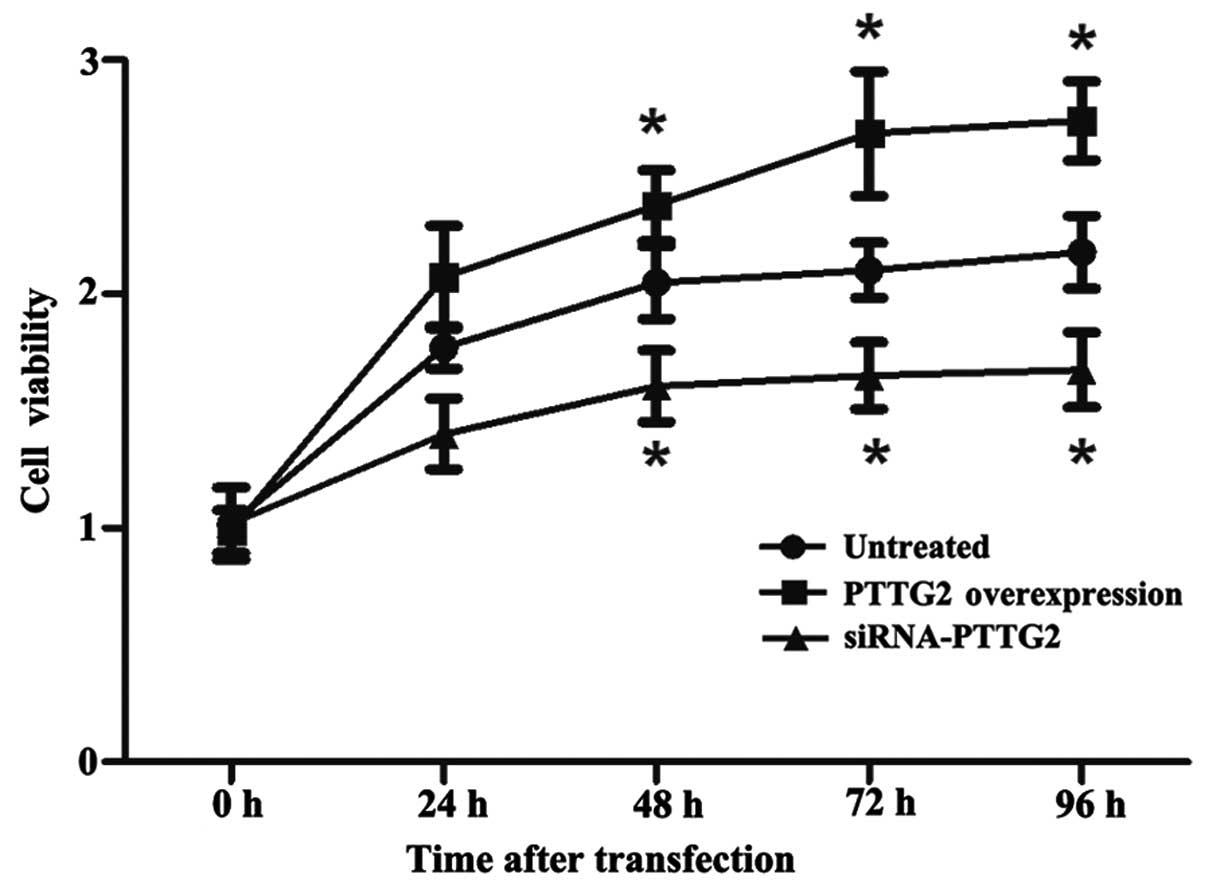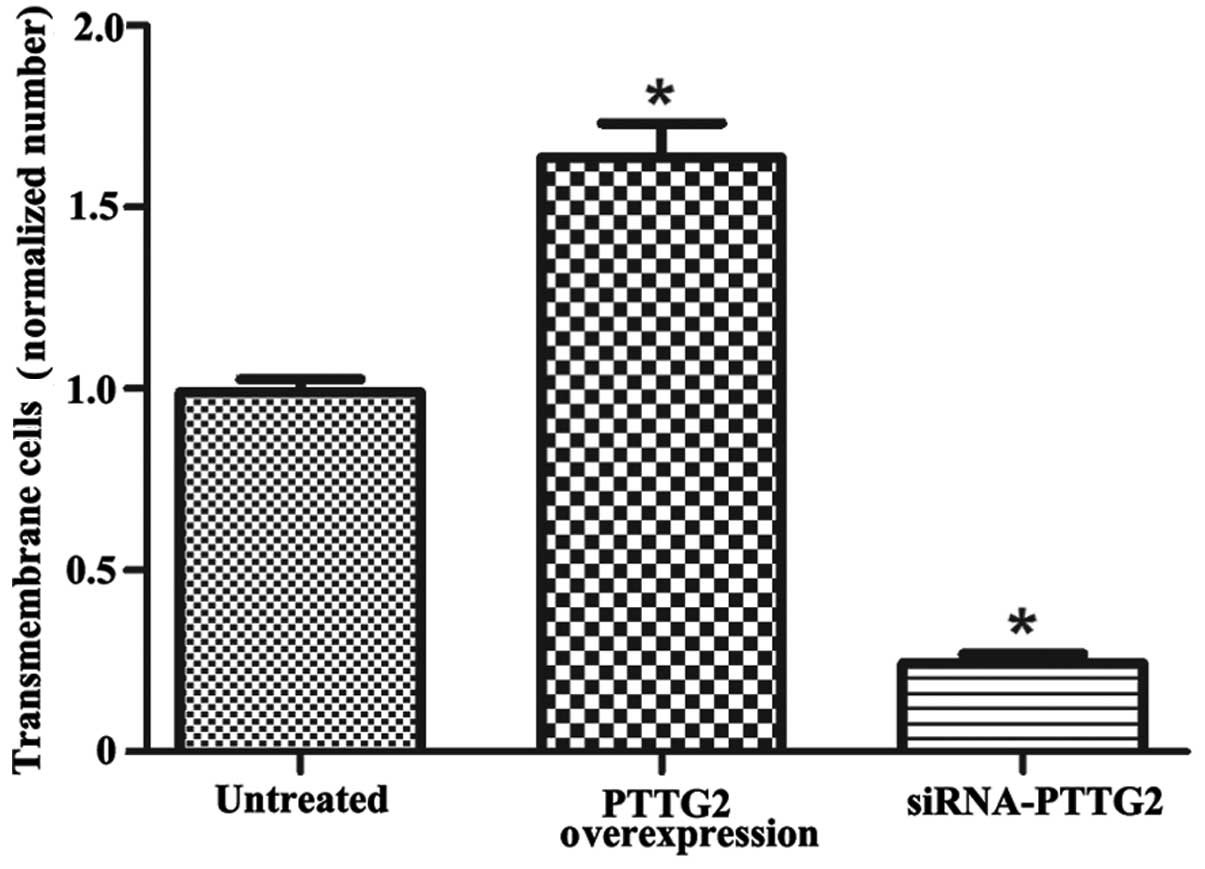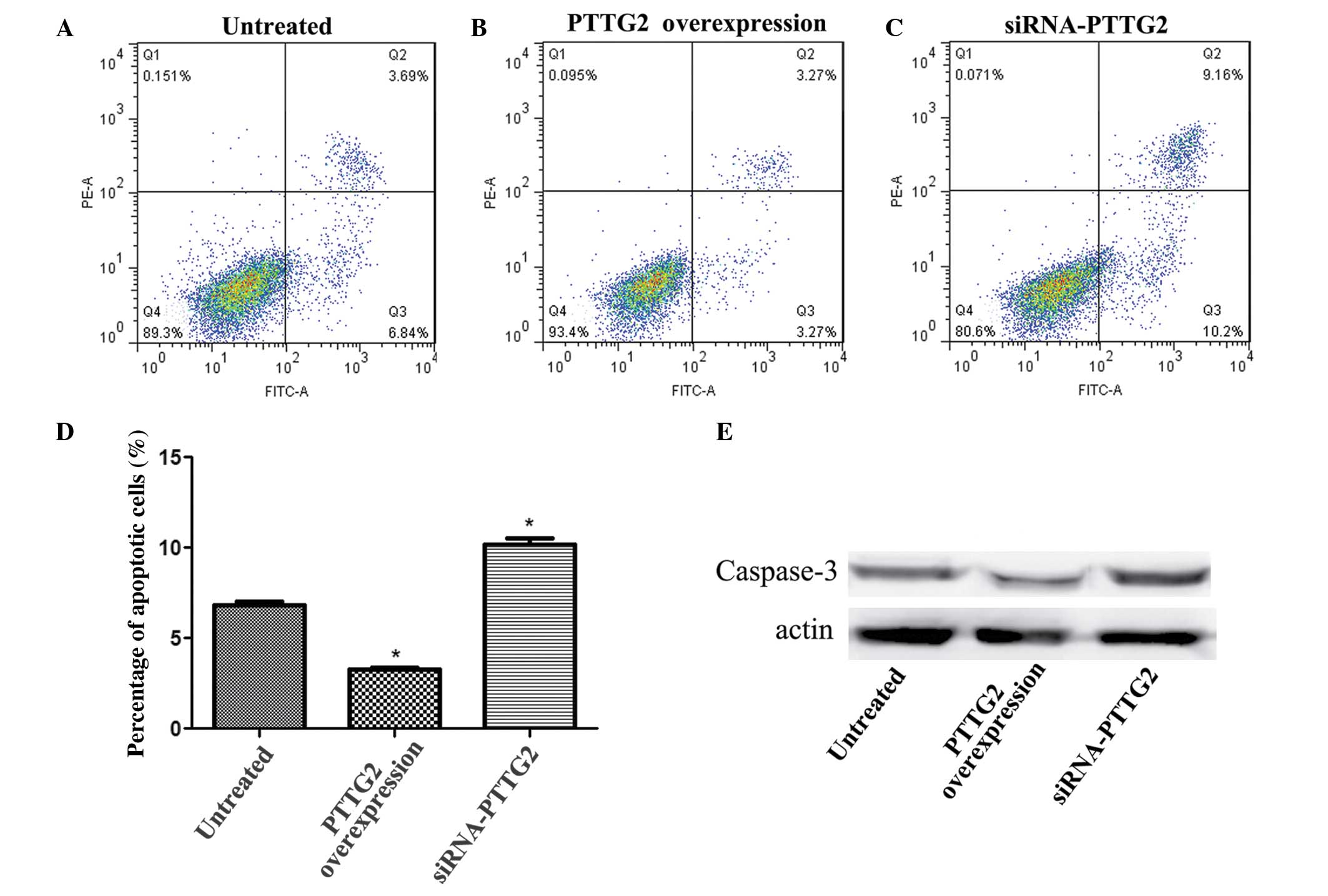|
1
|
Maher EA, Furnari FB, Bachoo RM, Rowitch
DH, Louis DN, Cavenee WK and DePinho RA: Malignant glioma: Genetics
and biology of a grave matter. Genes Dev. 15:1311–1333. 2001.
View Article : Google Scholar : PubMed/NCBI
|
|
2
|
Rao JS: Molecular mechanisms of glioma
invasiveness: The role of proteases. Nat Rev Cancer. 3:489–501.
2003. View
Article : Google Scholar : PubMed/NCBI
|
|
3
|
Stewart LA: Chemotherapy in adult
high-grade glioma: A systematic review and meta-analysis of
individual patient data from 12 randomised trials. Lancet.
359:1011–1018. 2002. View Article : Google Scholar : PubMed/NCBI
|
|
4
|
Stupp R, Mason WP, van den Bent MJ, Weller
M, Fisher B, Taphoorn MJ, Belanger K, Brandes AA, Marosi C, Bogdahn
U, et al: European Organisation for Research and Treatment of
Cancer Brain Tumor and Radiotherapy Groups; National Cancer
Institute of Canada Clinical Trials Group: Radiotherapy plus
concomitant and adjuvant temozolomide for glioblastoma. N Engl J
Med. 352:987–996. 2005. View Article : Google Scholar : PubMed/NCBI
|
|
5
|
Boelaert K, McCabe CJ, Tannahill LA,
Gittoes NJ, Holder RL, Watkinson JC, Bradwell AR, Sheppard MC and
Franklyn JA: Pituitary tumor transforming gene and fibroblast
growth factor-2 expression: Potential prognostic indicators in
differentiated thyroid cancer. J Clin Endocrinol Metab.
88:2341–2347. 2003. View Article : Google Scholar : PubMed/NCBI
|
|
6
|
Yang P, Yan W, Zhang W, You G, Bao ZS and
Jiang T: Whole-genome messenger RNA profiling reveals genes
involved in malignant progression of glioma. Zhonghua Yi Xue Za
Zhi. 93:5–7. 2013.(In Chinese). PubMed/NCBI
|
|
7
|
Clavreul A, Etcheverry A, Tétaud C,
Rousseau A, Avril T, Henry C, Mosser J and Menei P: Identification
of two glioblastoma-associated stromal cell subtypes with different
carcinogenic properties in histologically normal surgical margins.
J Neurooncol. 122:1–10. 2015. View Article : Google Scholar : PubMed/NCBI
|
|
8
|
Genkai N, Homma J, Sano M, Tanaka R and
Yamanaka R: Increased expression of pituitary tumor-transforming
gene (PTTG)-1 is correlated with poor prognosis in glioma patients.
Oncol Rep. 15:1569–1574. 2006.PubMed/NCBI
|
|
9
|
Vlotides G, Eigler T and Melmed S:
Pituitary tumor-transforming gene: Physiology and implications for
tumorigenesis. Endocr Rev. 28:165–186. 2007. View Article : Google Scholar : PubMed/NCBI
|
|
10
|
Livak KJ and Schmittgen TD: Analysis of
relative gene expression data using real-time quantitative PCR and
the 2-ΔΔCt method. Methods. 25:402–408. 2001. View Article : Google Scholar : PubMed/NCBI
|
|
11
|
Porra V, Bernaud J, Gueret P, Bricca P,
Rigal D, Follea G and Blanchard D: Identification and
quantification of fetal red blood cells in maternal blood by a
dual-color flow cytometric method: evaluation of the Fetal Cell
Count kit. Transfusion. 47:1281–1289. 2007. View Article : Google Scholar : PubMed/NCBI
|
|
12
|
Krex D, Klink B, Hartmann C, von Deimling
A, Pietsch T, Simon M, Sabel M, Steinbach JP, Heese O, Reifenberger
G, et al: Long-term survival with glioblastoma multiforme. Brain.
130:2596–2606. 2007. View Article : Google Scholar : PubMed/NCBI
|
|
13
|
Bradshaw C and Kakar SS: Pituitary tumor
transforming gene: An important gene in normal cellular functions
and tumorigenesis. Histol Histopathol. 22:219–226. 2007.PubMed/NCBI
|
|
14
|
Song-Bai X, Hong-Guang Z, Gang Z, Zuo X,
Hong-Quan Y and Shu-Hong K: The effect of PTTG gene silenced by
RNAi on inhibition of human glioblastoma U251 cells. Chin J
Gerontol. 7:645–647. 2008.
|
|
15
|
Ishikawa H, Heaney AP, Yu R, Horwitz GA
and Melmed S: Human pituitary tumor-transforming gene induces
angiogenesis. J Clin Endocrinol Metab. 86:867–874. 2001. View Article : Google Scholar : PubMed/NCBI
|
|
16
|
Méndez-Vidal C, Gámez-Del Estal MM,
Moreno-Mateos MA, Espina-Zambrano ÁG, Torres B and Pintor-Toro JA:
PTTG2 silencing results in induction of epithelial-to-mesenchymal
transition and apoptosis. Cell Death Dis. 4:e5302013. View Article : Google Scholar : PubMed/NCBI
|
|
17
|
Pei L: Identification of c-myc as a
down-stream target for pituitary tumor-transforming gene. J Biol
Chem. 276:8484–8491. 2001. View Article : Google Scholar : PubMed/NCBI
|
|
18
|
Canel M, Serrels A, Frame MC and Brunton
VG: E-cadherin-integrin crosstalk in cancer invasion and
metastasis. J Cell Sci. 126:393–401. 2013. View Article : Google Scholar : PubMed/NCBI
|
|
19
|
Lewis-Tuffin LJ, Rodriguez F, Giannini C,
Scheithauer B, Necela BM, Sarkaria JN and Anastasiadis PZ:
Misregulated E-cadherin expression associated with an aggressive
brain tumor phenotype. PLoS One. 5:e136652010. View Article : Google Scholar : PubMed/NCBI
|
|
20
|
Nieto MA: The ins and outs of the
epithelial to mesenchymal transition in health and disease. Annu
Rev Cell Dev Biol. 27:347–376. 2011. View Article : Google Scholar : PubMed/NCBI
|
|
21
|
Kidd ME, Shumaker DK and Ridge KM: The
role of vimentin intermediate filaments in the progression of lung
cancer. Am J Respir Cell Mol Biol. 50:1–6. 2014.PubMed/NCBI
|
|
22
|
Zhou R and Skalli O: TGF-α differentially
regulates GFAP, vimentin, and nestin gene expression in U-373 MG
glioblastoma cells: Correlation with cell shape and motility. Exp
Cell Res. 254:269–278. 2000. View Article : Google Scholar : PubMed/NCBI
|
|
23
|
Ray SK, Patel SJ, Welsh CT, Wilford GG,
Hogan EL and Banik NL: Molecular evidence of apoptotic death in
malignant brain tumors including glioblastoma multiforme:
Upregulation of calpain and caspase-3. J Neurosci Res. 69:197–206.
2002. View Article : Google Scholar : PubMed/NCBI
|
|
24
|
Huang TY, Tsai TH, Hsu CW and Hsu YC:
Curcuminoids suppress the growth and induce apoptosis through
caspase-3-dependent pathways in glioblastoma multiforme (GBM) 8401
cells. J Agric Food Chem. 58:10639–10645. 2010. View Article : Google Scholar : PubMed/NCBI
|


















